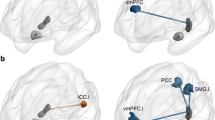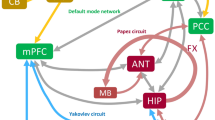Abstract
In the healthy human brain the hippocampus is known to work in concert with a variety of cortical brain regions. It has recently been linked to the default network of the brain, with the precuneus being its core hub. Here we studied the remote effects of damage to the hippocampus on functional connectivity patterns of the precuneus. From 14 epilepsy patients with selective, unilateral hippocampal sclerosis and 8 healthy control subjects, we acquired functional MRI data during performance of an object-location memory task. We assessed functional connectivity of a functionally defined region in the precuneus, which showed the typical properties of the default network: significant task-related deactivation, which was reduced in patients compared to control subjects. In control subjects, a largely symmetrical pattern of functional coherence to the precuneus emerged, including canonical default network areas such as ventral medial prefrontal cortex, inferior parietal cortex, and the hippocampi. Assessment of group differences within the default network areas revealed reduced connectivity to the precuneus in ipsilesional middle temporal gyrus and hippocampus in left hippocampal sclerosis patients compared to controls. Furthermore, left hippocampal sclerosis patients showed lower connectivity than right hippocampal sclerosis patients in left middle temporal gyrus, ventral medial prefrontal cortex, and left amygdala. We report remote effects of unilateral hippocampal damage on functional connectivity between distant brain regions associated with the default network of the human brain. These preliminary results underline the impact of circumscribed pathology on functionally connected brain regions.



Similar content being viewed by others
References
Greicius MD, Menon V (2004) Default-mode activity during a passive sensory task: uncoupled from deactivation but impacting activation. J Cogn Neurosci 16:1484–1492
Biswal B, Yetkin FZ, Haughton VM, Hyde JS (1995) Functional connectivity in the motor cortex of resting human brain using echo-planar MRI. Magn Reson Med 34:537–541
Horovitz SG, Fukunaga M, de Zwart JA, van Gelderen P, Fulton SC, Balkin TJ et al (2008) Low frequency BOLD fluctuations during resting wakefulness and light sleep: a simultaneous EEG–fMRI study. Hum Brain Mapp 29:671–682
Fox MD, Raichle ME (2007) Spontaneous fluctuations in brain activity observed with functional magnetic resonance imaging. Nat Rev Neurosci 8:700–711
Eichenbaum H (2000) A cortical-hippocampal system for declarative memory. Nat Rev Neurosci 1:41–50
Babb TL, Brown WJ (1987) Pathological findings in epilepsy. In: Engel J (ed) Surgical treatment of the epilepsies. Raven Press, New York, pp 511–540
Scoville WB, Milner B (1957) Loss of recent memory after bilateral hippocampal lesions. J Neurol Neurosurg Psychiatry 20:11–21
Saling MM, Berkovic SF, O’Shea MF, Kalnins RM, Darby DG, Bladin PF (1993) Lateralization of verbal memory and unilateral hippocampal sclerosis: evidence of task-specific effects. J Clin Exp Neuropsychol 60:8–618
Focke NK, Thompson PJ, Duncan JS (2008) Correlation of cognitive functions with voxel-based morphometry in patients with hippocampal sclerosis. Epilepsy Behav 12:472–476
Bonilha L, Alessio A, Rorden C, Baylis G, Damasceno BP, Min LL et al (2007) Extrahippocampal gray matter atrophy and memory impairment in patients with medial temporal lobe epilepsy. Hum Brain Mapp 28:1376–1390
Jokeit H, Seitz RJ, Markowitsch HJ, Neumann N, Witte OW, Ebner A (1997) Prefrontal asymmetric interictal glucose hypometabolism and cognitive impairment in patients with temporal lobe epilepsy. Brain 120:2283–2294
Wagner K, Frings L, Halsband U, Everts R, Buller A, Spreer J et al (2007) Hippocampal functional connectivity reflects verbal episodic memory network integrity. Neuroreport 18:1719–1723
Marques CM, Caboclo LO, da Silva TI, Noffs MH, Carrete HJ, Lin K et al (2007) Cognitive decline in temporal lobe epilepsy due to unilateral hippocampal sclerosis. Epilepsy Behav 10:477–485
Buckner RL, Andrews-Hanna JR, Schacter DL (2008) The brain’s default network: anatomy, function, and relevance to disease. Ann N Y Acad Sci 1124:1–38
Fransson P, Marrelec G (2008) The precuneus/posterior cingulate cortex plays a pivotal role in the default mode network: evidence from a partial correlation network analysis. Neuroimage 42:1178–1184
Oldfield RC (1971) The assessment and analysis of handedness: the Edinburgh inventory. Neuropsychologia 9:97–113
Van Paesschen W (2004) Qualitative and quantitative imaging of the hippocampus in mesial temporal lobe epilepsy with hippocampal sclerosis. Neuroimaging Clin N Am 14:373–400 vii
Helmstaedter C, Durwen HF (1990) The Verbal Learning and Retention Test. A useful and differentiated tool in evaluating verbal memory performance. Schweiz Arch Neurol Psychiatr 141:21–30
Lamberti G, Weidlich S (1999) DCS—a visual learning and memory test for neuropsychological assessment. Hogrefe and Huber, Seattle
Frings L, Wagner K, Halsband U, Schwarzwald R, Zentner J, Schulze-Bonhage A (2008) Lateralization of hippocampal activation differs between left and right temporal lobe epilepsy patients and correlates with postsurgical verbal learning decrement. Epilepsy Res 78:161–170
Friston KJ, Holmes A, Worsley K, Poline J, Frith C, Frackowiak R (1995) Statistical parametric maps in functional imaging: a general linear approach. Hum Brain Mapp 2:189–210
Kahn I, Andrews-Hanna JR, Vincent JL, Snyder AZ, Buckner RL (2008) Distinct cortical anatomy linked to subregions of the medial temporal lobe revealed by intrinsic functional connectivity. J Neurophysiol 100:129–139
Raichle ME, MacLeod AM, Snyder AZ, Powers WJ, Gusnard DA, Shulman GL (2001) A default mode of brain function. Proc Natl Acad Sci USA 98:676–682
Wagner AD, Shannon BJ, Kahn I, Buckner RL (2005) Parietal lobe contributions to episodic memory retrieval. Trends Cogn Sci 9:445–453
Schacter DL, Addis DR, Buckner RL (2008) Episodic simulation of future events: concepts, data, and applications. Ann N Y Acad Sci 1124:39–60
Hassabis D, Kumaran D, Vann SD, Maguire EA (2007) Patients with hippocampal amnesia cannot imagine new experiences. Proc Natl Acad Sci USA 104:1726–1731
Andreasen NC, O’Leary DS, Cizadlo T, Arndt S, Rezai K, Watkins GL et al (1995) Remembering the past: two facets of episodic memory explored with positron emission tomography. Am J Psychiatry 152:1576–1585
Gusnard DA, Akbudak E, Shulman GL, Raichle ME (2001) Medial prefrontal cortex and self-referential mental activity: relation to a default mode of brain function. Proc Natl Acad Sci USA 98:4259–4264
Cavanna AE, Trimble MR (2006) The precuneus: a review of its functional anatomy and behavioural correlates. Brain 129:564–583
Rombouts SA, Barkhof F, Goekoop R, Stam CJ, Scheltens P (2005) Altered resting state networks in mild cognitive impairment and mild Alzheimer’s disease: an fMRI study. Hum Brain Mapp 26:231–239
Dickerson BC, Sperling RA (2008) Functional abnormalities of the medial temporal lobe memory system in mild cognitive impairment and Alzheimer’s disease: insights from functional MRI studies. Neuropsychologia 46:1624–1635
Baliki MN, Geha PY, Apkarian AV, Chialvo DR (2008) Beyond feeling: chronic pain hurts the brain, disrupting the default-mode network dynamics. J Neurosci 28:1398–1403
Pantelis C, Velakoulis D, McGorry PD, Wood SJ, Suckling J, Phillips LJ et al (2003) Neuroanatomical abnormalities before and after onset of psychosis: a cross-sectional and longitudinal MRI comparison. Lancet 361:281–288
Greicius M (2008) Resting-state functional connectivity in neuropsychiatric disorders. Curr Opin Neurol 24:424–430
Addis DR, Moscovitch M, McAndrews MP (2007) Consequences of hippocampal damage across the autobiographical memory network in left temporal lobe epilepsy. Brain 130:2327–2342
Gleissner U, Helmstaedter C, Schramm J, Elger CE (2004) Memory outcome after selective amygdalohippocampectomy in patients with temporal lobe epilepsy: one-year follow-up. Epilepsia 45:960–962
Bonilha L, Rorden C, Halford JJ, Eckert M, Appenzeller S, Cendes F et al (2007) Asymmetrical extra-hippocampal grey matter loss related to hippocampal atrophy in patients with medial temporal lobe epilepsy. J Neurol Neurosurg Psychiatry 78:286–294
Carrete HJ, Abdala N, Lin K, Caboclo LO, Centeno RS, Sakamoto AC et al (2007) Temporal pole signal abnormality on MR imaging in temporal lobe epilepsy with hippocampal sclerosis: a fluid-attenuated inversion-recovery study. Arq Neuropsiquiatr 65:553–560
He BJ, Snyder AZ, Vincent JL, Epstein A, Shulman GL, Corbetta M (2007) Breakdown of functional connectivity in frontoparietal networks underlies behavioral deficits in spatial neglect. Neuron 53:905–918
Ranganath C, Heller A, Cohen MX, Brozinsky CJ, Rissman J (2005) Functional connectivity with the hippocampus during successful memory formation. Hippocampus 15:997–1005
Van Paesschen W, Dupont P, Van Driel G, Van Billoen H, Maes A (2003) SPECT perfusion changes during complex partial seizures in patients with hippocampal sclerosis. Brain 126:1103–1111
Gotman J, Grova C, Bagshaw A, Kobayashi E, Aghakhani Y, Dubeau F (2005) Generalized epileptic discharges show thalamocortical activation and suspension of the default state of the brain. Proc Natl Acad Sci USA 102:15236–15240
Laufs H, Lengler U, Hamandi K, Kleinschmidt A, Krakow K (2006) Linking generalized spike-and-wave discharges and resting state brain activity by using EEG/fMRI in a patient with absence seizures. Epilepsia 47:444–448
Laufs H, Hamandi K, Salek-Haddadi A, Kleinschmidt AK, Duncan JS, Lemieux L (2007) Temporal lobe interictal epileptic discharges affect cerebral activity in “default mode” brain regions. Hum Brain Mapp 28:1023–1032
Jokeit H, Okujava M, Woermann FG (2001) Carbamazepine reduces memory induced activation of mesial temporal lobe structures: a pharmacological fMRI-study. BMC Neurol 1:6
Conflict of interest statement
The authors declare that the research was conducted in the absence of any commercial or financial conflict of interest.
Author information
Authors and Affiliations
Corresponding author
Rights and permissions
About this article
Cite this article
Frings, L., Schulze-Bonhage, A., Spreer, J. et al. Remote effects of hippocampal damage on default network connectivity in the human brain. J Neurol 256, 2021–2029 (2009). https://doi.org/10.1007/s00415-009-5233-0
Received:
Revised:
Accepted:
Published:
Issue Date:
DOI: https://doi.org/10.1007/s00415-009-5233-0




